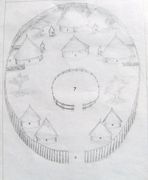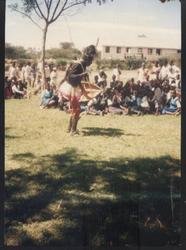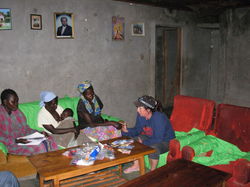Rusinga Island Organic Farm
The Lakeside Baptist Development Project is dedicated to providing for the spiritual, educational, and health needs of our community. However, hunger remains a reality for many of our community’s economically disadvantaged. When there is no food on the table, it is difficult to concern one’s self with higher aspirations, such as educational achievement. To address this most basic of needs, we have dedicated a portion of our resources to focusing on the promotion of a backyard subsistence farming system, known locally as “nyamgutu”.
Who specifically is the target group for this nyamgutu system?The majority of the Island’s people are fishermen. Their diet is based primarily on fish with little or no nutritional variation. A lack of fruits and vegetables results in a majority who are malnourished, including many children, whose growing bodies are in desperate need of the vitamins and minerals provided by a varied diet.
Those members of our community who don’t fish engage in commercial agriculture. Failing to understand the benefits of a diverse diet, these farmers produce by monoculture, again lacking in the variety necessary to support a healthy diet.
Why is it important to focus on “organic” means of food production?By definition, “organic” means; farming without the use of chemicals, fertilizers, or other commercial treatments. This means making use of the resources that are already available in our backyards, resulting in a cheap and practical food source. This form of farming is also easily accessible: the principles of organic farming, specific to Rusinga Island, can be easily shared among community members, as no highly technical knowledge is necessary.
Want to join us in our efforts as we help the members of the Rusinga Island community attain food security?We are seeking volunteers who are interested in working with us on our farm and in our community. You are welcomed to stay with our family, and we will provide you with 3 meals a day and accommodation. In return, you will be requested to help in our nyamgutu (ploughing, planting, weeding, harvesting, etc.) and in any other field of interest to you (for example: meal preparation, assisting in our medical clinic, or teaching). You are more than welcome to offer any of your skills or expertise, but even if you consider yourself “unskilled” in any of these fields, you are warmly invited to join us. Of course we will also give you the opportunity to get out and see the sites of Rusinga Island (meeting community members, enjoying scenery, and visiting historical sites).
If you would like to join us, please visit the “Contact” page and send us a message expressing your interest.Visitors are welcome to be entertained by traditional dancers, musicians and storytellers as shown in the photograph below.
Africa Center (Luo Traditional Homested)
KEY TO LUO TRADITIONAL HOMESTED
1. Hut of the first wife (Mikayi)
2. Kitchen Gardens (Nyamgutu)
3. Granaries (Dero)
4. House of the second wife (Nyachira)
5. Cortege of the husband (Abila)
6. House of the third wife (Reru)
NOTE:Click on the photo to view it in full size.
7. Animal Shed (Kul)
8. Corteges of the sons (Simbni)
9. Entrances (Rangeye)
NOTE: Luo men had three defined wives, however each man could marry as many women as he wished; the others were known as "maids".


